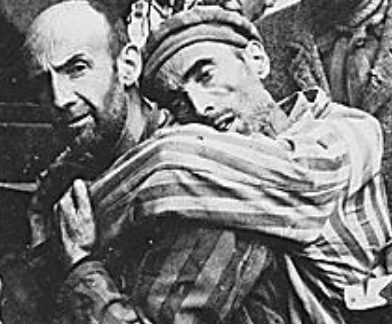
Holocaust Remembrance Day

Image of Bronja Meniuk, an orphan of the Holocaust who was granted permission and immigrated to the United States by plane on May 4, 1951.
 The National Archives is the international epicenter of Holocaust-related research. NARA holds millions of records created or received by the U.S. Government during and after World War II that document Nazi war crimes, wartime refugee issues, and activities and investigations of U.S. Government agencies involved in the identification and recovery of looted assets (including gold, art, and cultural property)—as well as captured German records used as evidence at the Nuremberg International Military Tribunals. We not only hold these records, we provide access to them.
The National Archives is the international epicenter of Holocaust-related research. NARA holds millions of records created or received by the U.S. Government during and after World War II that document Nazi war crimes, wartime refugee issues, and activities and investigations of U.S. Government agencies involved in the identification and recovery of looted assets (including gold, art, and cultural property)—as well as captured German records used as evidence at the Nuremberg International Military Tribunals. We not only hold these records, we provide access to them.
Read more about records relating to Holocaust research, view a sampling of the most requested Holocaust-Era images, and review thousands of pages of digitized records relating to the Holocaust.
Featured Document
 Never Forget: Remembering the Holocaust. By the end of World War II, the Holocaust had claimed the lives of over 6 million Jewish people—nearly two out of every three in Europe. A letter describing the concentration camp at Dachau, Germany, from Harold Porter to his parents is presented in memory of all Jewish victims of the Holocaust and other victims of Nazism.
Never Forget: Remembering the Holocaust. By the end of World War II, the Holocaust had claimed the lives of over 6 million Jewish people—nearly two out of every three in Europe. A letter describing the concentration camp at Dachau, Germany, from Harold Porter to his parents is presented in memory of all Jewish victims of the Holocaust and other victims of Nazism.
Online Resource for Teachers
- Teaching the Holocaust with Primary Sources at the National Archives and U.S. Holocaust Memorial Museum
- DocsTeach: U.S. Policy and the Holocaust Refugee Crisis
- DocsTeach: The SS Quanza and European War Refugees
- DocsTeach: Analyzing a Writing Assignment by a Teenage Refugee in New York During World War II
- World War II resources page on DocsTeach
- "Investigating the Holocaust" (Franklin D. Roosevelt Presidential Library and Museum)
- FDR Library: "Never Again IS Now" Teachers Conference (video playlist), 2021
- Truman Library Student Activity: Truman and the Holocaust
- Truman Library Project Whistlestop Learning Unit: The Holocaust
PDF files require the free Adobe Reader.
More information on Adobe Acrobat PDF files is available on our Accessibility page.